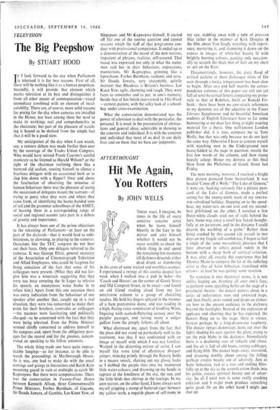The Big Peepshow
TELEVISION
By STUART HOOD
My' anticipation of the day when I can watch, say, a censure debate was made livelier than ever by the coverage of the Trades Union Congress. Who would have missed Frank Cousins's careful manicure as he listened to Harold Wilson? or the sight of the chairman reclining there like a battered old sealion, rousing himself to silence a fractious delegate with an occasional bark or to slap him down with a flipper? Over and above the fascination of observing the minutiae of human behaviour there was the pleasure of seeing the succession of delegates mount the rostrum—of trying to guess what they were and where they came from, of identifying the horny-handed sons of toil and the grammar schoolboys of the ASSET, of hearing them in a corresponding range of social and regional accents take part in a debate of gravity and importance.
It has always been one of the prime objections to the televising of Parliament—at least on the part of the diehards—that it would lead to exhi- bitionism, to clowning, to playing to the cameras. Occasions like the TUC congress do not bear out their fears. Only one delegate referred to the cameras. It was George Elvin, general secretary of the Association of Cinematograph Television and Allied Employees, who could be forgiven for being conscious of the fact that some of his colleagues were present. (What they did not for- give him was a wisecrack suggesting that they were too busy covering the St Leger to televise his speech; an anonymous voice broke in to refute. him.) Apart from this one odcasion there was every indication from the behaviour of one speaker after another that, caught up in a real situation, they were too concerned to make their point for their brothers, comrades or colleagues —the nuances were fascinating and politically charged—to be concerned with the fact that they were being televised. Even the Prime Minister seemed chiefly concerned to address himself to the congress and, apart from the obligatory pass- ages for the record and for the gnomes, concen- trated on speaking to his fellow unionists.
The whole thing made one have quite imprac- ticable longings—as for instance, to be able to watch the proceedings in Marlborough House. As it was, one had to make do with the usual comings and goings in limousines and Keith Kyle mounting guard in vain at midnight to catch Mr Kapwepwe. But there were compensations. There was the conversation in Twenty-Four Hours between Kenneth Allsop, three Commonwealth Prime Ministers, Forbes Burnham, of Guyana, Sir Dauda Jawara, of Gambia, Lee Kuan Yew, of Singapore, and Mr Kapwepwe himself. It started off like one of the routine question and answer sessions which the staff of that programme con- duct with professional competence. It ended up as a demonstration of the mood of the new nations, impatient of phrases, realistic, self-assured. That mood was expressed not only in what the states- men said but in ,their behaviour, expressions, mannerisms. Mr Kapwepwe, grinning like a leprechaun. Forbes Burnham, sardonic and terse. Sir Dauda Jawara, very reasonable, quietly insistent that Rhodesia is Britain's business. Lee Kuan Yew, agile, charming and tough. They were faces to remember and to put, in one's memory, beside that of Ian Smith interviewed in This Week —earnest, patient, with the sulky look of a school- boy under cross-examination.
What the conversation demonstrated was the power of television to deal with the particular, the personal. It is weak in the presentation of abstrac- tions and general ideas; admirable in showing us the concrete and individual. It is with the concrete and individual that most of us deal in our daily lives and on them that we base our judgments.


































 Previous page
Previous page